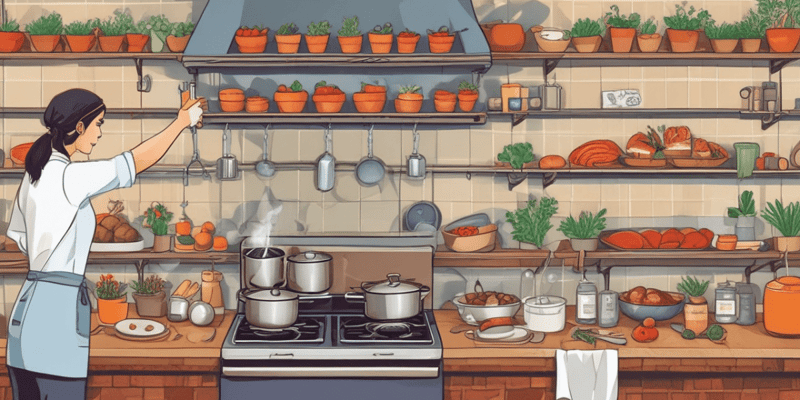16 Questions
Food preservation is the process of treating and handling food in such a way as to stop or slow down food ______ to prevent foodborne illness and extend its shelf-life.
spoilage
In earlier times, before 1200 BC, sun and wind were used to dry ______, vegetables and fruits.
meats
Food ______ refers to the undesirable changes in the deterioration of food which causes it to be no longer safe for human consumption.
spoilage
Signs of food spoilage include ______ odors, brown meats, sour milk, and mushy vegetables.
off
Microorganisms, enzymes, and chemical reactions can cause food to ______.
spoil
Molds are microscopic fungi that can form visible ______.
colonies
Yeasts are a single-celled living organism that occurs on or in foods rich in ______ carbohydrates.
fermentable
Enzymes help facilitate chemical reactions that cause foods to ______.
spoil
The enzyme that causes the brownish colour to appear in apples is called ______ oxidase.
polyphenol
E. coli causes ______ problems which can lead to death.
diarrheal
Salmonella causes ______ infections.
gastroenteritis
Clostridium botulinum produces the ______ botulin, which causes flaccid muscular paralysis.
neurotoxin
The main objective of food preservation is the removal of ______ or inactivating them.
micro-organisms
One of the reasons for food preservation is to prevent ______ of food when there is plenty in season.
wastage
Food preservation makes food available when they are ______ or out of season.
unavailable
Natural food preservation is an ancient technique used to increase the ______ life of perishable products.
shelf
Study Notes
What is Food Preservation?
- Food preservation is the process of treating and handling food to stop or slow down food spoilage, prevent foodborne illness, and extend its shelf-life.
History of Food Preservation
- Before 1200 BC, people used sun and wind to dry meats, vegetables, and fruits.
- They hunted and collected food from the forest and rivers to eat as part of their daily meal.
- Over time, they realized that preserving food could help prevent food spoilage.
What is Food Spoilage?
- Food spoilage refers to the undesirable changes in food that make it unsafe for human consumption.
- These changes affect the overall quality of food, including its flavor, color, texture, and smell.
Signs of Food Spoilage
- Off-odors
- Brown meats
- Sour milk
- Mushy vegetables
Causes of Food Spoilage
- Light
- Oxygen (oxidation through exposure to air)
- Heat
- Humidity
- Temperature
- Spoilage bacteria
- Microorganisms (mold, bacteria, yeast)
- Enzymes and chemical reactions
Microorganisms
- Mold: microscopic fungi that form visible colonies
- Bacteria: microscopic organisms that spoil food and produce toxins
- Yeast: single-celled living organism that occurs on or in foods rich in fermentable carbohydrates
Effects of Food Spoilage
- E. coli: causes diarrheal problems, which can lead to death
- Salmonella: causes gastroenteritis infections
- Clostridium botulinum: produces neurotoxin botulin, causing flaccid muscular paralysis
Principles of Food Preservation
- Main objective: removal or inactivation of microorganisms
- Methods: removing air, water, lowering or increasing temperature, increasing concentration of salt or sugar or acid in foods
- Three basic objectives: prevention of contamination, delay or prevention of microorganism growth, and delay of enzymic spoilage
Reasons for Food Preservation
- Prevent food wastage
- Change raw products into more stable forms for longer shelf life
- Make food available when it's out of season
- Preserve food color, shape, smell, and size
Classification of Food Preservation
- Natural food preservation: an ancient technique used to increase shelf life
- Artificial/Chemical food preservation: uses preservatives to extend shelf life
Learn about the process of food preservation, its history, and methods to prevent food spoilage and extend shelf-life.
Make Your Own Quizzes and Flashcards
Convert your notes into interactive study material.
Get started for free



